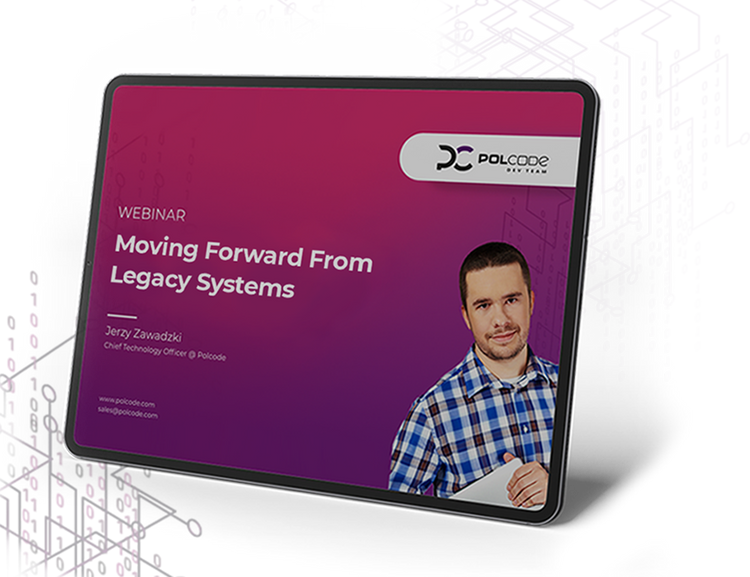
Modernizing legacy systems has become a crucial strategy for businesses aiming to stay competitive and agile in today’s market. As economic conditions fluctuate and market demands evolve, adapting swiftly is more important than ever. Legacy systems often block this adaptability, restraining growth and innovation.
Here's why updating these outdated systems is beneficial and essential for achieving business success.

Why Modernizing Legacy Systems is Crucial for Your Business
Modernizing legacy systems has become a crucial strategy for businesses aiming to stay competitive and agile in today’s market. As economic conditions fluctuate and market demands evolve, adapting swiftly is more important than ever. Legacy systems often block this adaptability, restraining growth and innovation.
Here's why updating these outdated systems is beneficial and essential for achieving business success.
The Cost of Inaction
Legacy systems are expensive to maintain and often lack the necessary features and integrations required to keep pace with modern business goals. They become barriers to efficiency, scalability, and innovation. For instance, outdated Customer Relationship Management (CRM) tools can force businesses to use multiple other applications just to cover the missing features, leading to inefficiencies and increased operational costs.
Moreover, legacy systems pose significant security risks. Without regular updates and security patches, these systems are vulnerable to cyberattacks. According to estimates, a new ransomware attack hits a business approximately every 11 seconds, and the average data breach cost is now roughly $4.35 million globally. The stakes are high, and maintaining outdated software is like waiting for a disaster to strike.
Here’s why updating these outdated systems is essential for achieving business success.
Strategic Advantages of Modernization
Modernizing legacy systems unlocks numerous benefits, positioning companies to better respond to market changes and customer needs. It enhances agility, allowing businesses to introduce new features, customization options, and scalability. This adaptability is essential for thriving in diverse markets and maintaining a competitive edge.
Jerzy Zawadzki, CTO of Polcode, emphasizes, "Traditionally, technology was less important than business goals. However, technology can either help us achieve those goals or hold us back. In today's fast-changing tech world, it's crucial to keep our technology up to date".
Misconceptions About Legacy Systems
It's important to note that not every legacy system is inherently harmful. In certain contexts, such as 'throw-away' prototypes or projects with a defined lifecycle and end date, using older tools may be appropriate. However, for core business processes and programs that underpin long-term strategy and operations, clinging to legacy technologies can pose significant risks.
Conclusion
The imperative to modernize legacy systems is clear. It's not just about staying current with technology; it's about supporting business growth, ensuring security, and maintaining competitive advantage. Companies that leverage the latest technologies and practices are more likely to outperform their competitors and thrive in an unpredictable economic environment.
For more detailed information on the importance of modernizing legacy systems and the misconceptions surrounding them, check out Chapter 5: The Imperative to Modernize and Chapter 6: Misconceptions About Legacy Systems in our e-book “Legacy Software Modernization - A Guide for Enterprises”.

On-demand webinar: Moving Forward From Legacy Systems
Transform your outdated IT system and eliminate legacy code issues. Join our on-demand webinar hosted by our CTO, Jerzy Zawadzki, and discover how to revitalize your technology.

Latest Blog Posts
Is Your E-commerce Business Ready for the European Accessibility Act?
Jun 16, 2025 by Janusz Toczko
Legacy Software and Security Risks: Why Regular Audits Are Your Best Defense
Jun 4, 2025 by Jerzy Zawadzki
Magento Enters the SaaS Arena: What Adobe Commerce as a Service Means for Your Business
Apr 24, 2025 by Jerzy Zawadzki
Let's Discuss Your Vision
Plan a Roadmap
Together, we’ll outline a clear, step-by-step plan covering setup, customization, data migration, and launch strategy.
Customization & Integration
Let our specialists handle template design, plugin integration, and any custom functionalities to make your store uniquely yours.
Launch with Confidence
Prepare for go-live with dedicated support from our team, ensuring a seamless transition and a high-performing, secure store.

